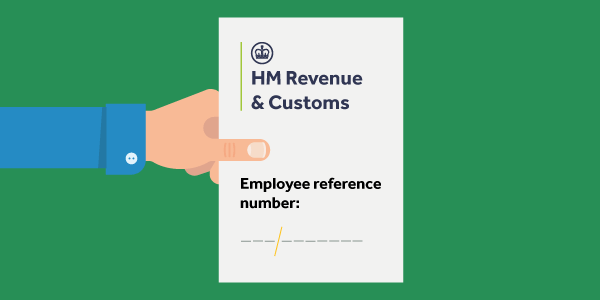
Don't know what an Employer Reference Number is? Not sure why you need one? Can't remember if you have one?
No problem. Here's why your Employer Reference Number (ERN) is important; to you, to your insurer, and to your insurance.
(Warning: acronyms ahead. Lots of them.)
What's an ERN & what does it look like?
Every business registered with HM Revenue and Customs (HMRC) as an employer is given an ERN. It’s a unique set of letters and numbers used by the taxman to identify your business. It’s made up of a three-digit HMRC office number and a reference number unique to you.
You might’ve seen it referred to as an 'employer PAYE reference' on tax forms. It's also on a pay slip, P45, or P60, and it's usually in one of these formats:
123/Az12345
123/A12345
What’s an Employer Reference Number used for?
It's mainly for end-of-year PAYE returns. Missing or invalid ERNs are the most common reasons for HMRC rejecting end-of-year returns.
Employees might ask you for your ERN – they’ll need it if they’re applying for things like tax credits. You might also have to include it on their pay slips, if you don’t already.
And, if you’ve recently bought or renewed an employer’s liability insurance (EL) policy with us, you might find your insurer wants to know your ERN too.
Following new legislation introduced in 2012, it became the insurer's responsibility to collect ERNs at the same time as setting customers up with EL cover. Things have changed since, and the Employers’ Liability Tracing Office (ELTO) now works alongside HMRC and the Financial Conduct Authority (FCA) to capture ER numbers directly.
That means many insurers no longer ask for your ERN when you buy EL. Although some are still to make the switch fully. The good news being that it's one less job for you.
Why does your ERN have to be declared?
In the event of an EL claim it’s necessary to identify – quickly and efficiently – all the companies where the employee in question has worked. EL insurance claims can occur years after the alleged event (in cases of exposure to harmful substances, for example) and trawling through mountains of paperwork to find the relevant insurer is both time-consuming and problematic.
ERNs streamline this process and make life a whole lot easier for both claimants and insurers alike.
Who doesn't need an Employer Reference Number?
As with all these things, there are exemptions and some businesses don't need an ERN.
They are:
- Businesses where all employees are below the PAYE tax threshold and don't have another job, receive a pension, or receive benefits.
- Businesses registered outside England, Scotland, Wales or Northern Ireland.
- Businesses without employees.
- Business whose only employees are paid as self-employed or via an agency.
Don't have an ERN? Or think you’ve lost it?
If you employ someone (or are thinking of doing so) you should be registered with HMRC as an employer.
If you don’t think you have an employer reference number, it could mean that you’re not registered. Make sure you double-check with HMRC that you are.
And if you can’t find it? Don’t worry. Any correspondence you’ve had from HMRC about PAYE will have your ERN on it. It’s also noted on any P45 or P60 for both past and present employees (if you have copies).
One last thing
Now you know why an Employer Reference Number is so important, hopefully you understand why it's key to keep it safe and to hand.
Have any other questions about your ERN? Or have some nagging concerns about employers' liability insurance? Give us a call on 0345 222 5391. Our team of insurance experts will be happy to help.
Image used under license from Shutterstock.
employer reference numberrules and regulationsrunning a business
